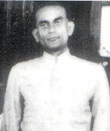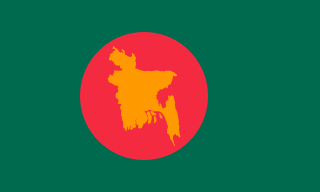
Syed Nazrul Islam was a Bangladeshi politician and a senior leader of the Awami League. During the Bangladesh Liberation War, he was declared as the Vice President of Bangladesh by the Provisional Government. He served as the Acting President in the absence of Sheikh Mujibur Rahman.
Independence of Bangladesh was declared on 26 March 1971, celebrated as Independence Day, from Pakistan. The Independence Day of Bangladesh is celebrated on 26 March when Sheikh Mujibur Rahman declared the independence of Bangladesh. The Bangladesh Liberation War started on 26 March and lasted till 16 December 1971 which is celebrated as Victory Day in Bangladesh. There is a dispute along partisan line on who declared the Independence of Bangladesh. The Awami League claim Sheikh Mujibur Rahman while the Bangladesh Nationalist Party claim it was Ziaur Rahman.
Khondaker Mostaq Ahmad was a Bangladeshi politician. He was the fourth president of Bangladesh from 15 August to 6 November 1975, after the assassination of Sheikh Mujibur Rahman. He was involved in the assassination of Bangabandhu Sheikh Mujibur Rahman on 15 August 1975. He took on the role of president immediately after the assassination, praised the assassins as "sons of the sun" and put cabinet ministers loyal to Sheikh Mujibur Rahman in jail.
Mohammad Abdul Hannan was a politician of Bangladesh.

Kushtia District is a district in the Khulna administrative division of western Bangladesh. Kushtia is the second largest municipality in Bangladesh and the eleventh largest city in the country. Kushtia has existed as a separate district since the partition of India. Prior to that, Kushtia was a part of Nadia district. Kushtia is the birthplace of many historical figures including Mir Mosharraf Hossain (1847–1912), Bagha Jatin (1879–1915) and Lalon (1774–1890). Nobel laureate poet Rabindranath Tagore lived his early life at Shelaidaha.

Meherpur is the northwestern district of Khulna Division in southwestern Bangladesh. It is bordered by the Indian state of West Bengal to the west, and by the Bangladeshi districts of Kushtia and Chuadanga to the east. Pre-independence Meherpur was a subdivision of Nadia district. The district has an area of 716.08 square kilometres (276.48 sq mi).

Maulana Azad College is a public institute of liberal arts, commerce and science in India, located in central Kolkata, West Bengal, India. The college is fully government-administered. It is located near the junction of Rafi Ahmed Kidwai Road and SN Banerjee Road, popularly called "Lotus crossing".
The Bangladesh Liberation War started on 26 March 1971 and ended on 16 December 1971. Some of the major events of the war are listed in the timeline below.

Muhammad Mansur Ali was a Bangladeshi politician who was a close confidant of Sheikh Mujibur Rahman, the founding leader of Bangladesh. A senior leader of the Awami League, Mansur also served as the Prime Minister of Bangladesh in 1975.

Abul Hasnat Muhammad Qamaruzzaman was a Bangladeshi politician, government minister and a leading member of the Awami League. A member of the Mujibnagar Government, Qamaruzzaman was murdered along with Syed Nazrul Islam, Muhammad Mansur Ali and Tajuddin Ahmed in the jail killings in Dhaka Central Jail on 3 November 1975 by a group of army officers on the instruction of President Mostaq.
Meherpur Sadar is an upazila of Meherpur District in the Division of Khulna, Bangladesh. Meherpur is the smallest district of Bangladesh in the South-western part within the Khulna Division. Before the partition in 1947, Meherpur was a part of the Nadia district of undivided India. Before 1984, it was a subdivision of Kushtia district. Meherpur consists of 1 municipality, 9 wards and 72 mahallas, 3 upazilas, 18 union parishads, 277 villages, 190 mouzas. The upazilas are Meherpur Sadar, Gangni and Mujibnagar.
Mujibnagar is an upazila (subdistrict) of Meherpur District in Bangladesh.

The 1969 East Pakistan uprising was a democratic political uprising in East Pakistan. It was led by Awami League against Muhammad Ayub Khan, the president of Pakistan in protest of the Agartala Conspiracy Case and the incarceration of Sheikh Mujibur Rahman among other Bengali nationalists.

The Provisional Government of Bangladesh, popularly known as the Mujibnagar Government; also known as the Bangladeshi government-in-exile, was a provisional government that was established following the declaration of independence of East Pakistan as Bangladesh on 10 April 1971. Headed by prime minister Tajuddin Ahmad, it was the supreme leadership of the Bangladeshi liberation movement, comprising a cabinet, a diplomatic corps, an assembly, an armed force, and a radio service. It operated as a government-in-exile from its secretariat on 8 Theatre Road, Kolkata.

The Constituent Assembly of Bangladesh was the constituent assembly of Bangladesh. It was the country's provisional parliament between 1971 and 1973. In 1972, it drafted and adopted the Constitution of Bangladesh. The assembly was dominated by the Awami League, with a minority being independent lawmakers.
Mashiur Rahman (1920–1971) was a Bangladeshi lawyer and politician, a member of the East Bengal Legislative Assembly and cabinet minister in the East Pakistan government of Ataur Rahman Khan. He was instrumental in the founding of the Bangladesh Awami League and in the Bengali Language Movement, and supported Sheikh Mujibur Rahman.

Abdul Mannan was a Bangladesh Awami League politician and the first Minister of Home Affairs of independent Bangladesh from April 1972 to March 1973.

Muhammad Yusuf Ali was a Bangladesh politician. He was the first minister for Education and Cultural Affairs in the first cabinet of Bangladesh.

Muktijoddha Sangsad a non-political welfare association of the combatants during the Bangladesh Liberation War formed on 13 February 1972. The organisation has a football club, Muktijoddha Sangsad KC, named after itself.













